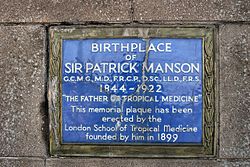This Day in History: October 3, 1844
Additional Date: October 3, 1844
On 3 October 1844, Sir Patrick Manson was born in Oldmeldrum in Aberdeenshire, Scotland. He was an important physician at the time, and contributed to research in the field of parasitology, and the founder of tropical medicine.
In particular, Manson's theories about the mosquito and its contribution to the spread of disease were significant. Under observation, Manson theorised that the mosquito activated the life cycle of the worm, Filaria, which causes elephantiasis.
These observations, made during his time as medical officer for the Chinese Imperial Maritime Customs, also lead to the conclusion that mosquitoes are in fact the carriers of plasmodium, a parasite which causes malaria.
Under his supervision, Sir Ronald Ross described the life cycle of plasmodium, and later won the Nobel Prize in 1902, after he proved Manson's theory.
Manson continued to teach on his return from his contract in Asia in 1889, and opened up the London School of Hygiene and Tropical Medicine on 2 October 1889.
Manson's pioneer work in parasitology therefore lead to an important medicinal breakthrough, one that would be very valuable in treating malaria in South Africa, where people suffer from the disease in certain parts of the country, and in many areas of the African continent.
